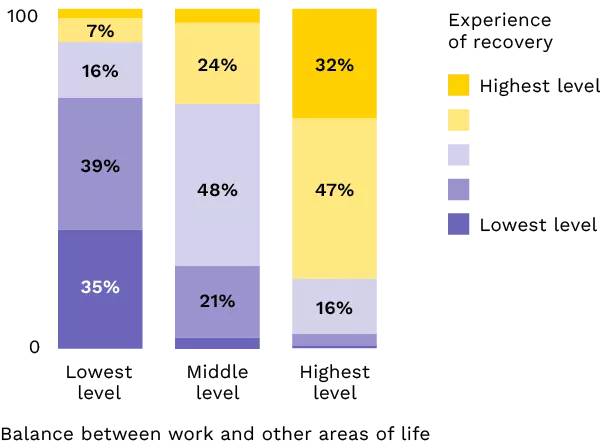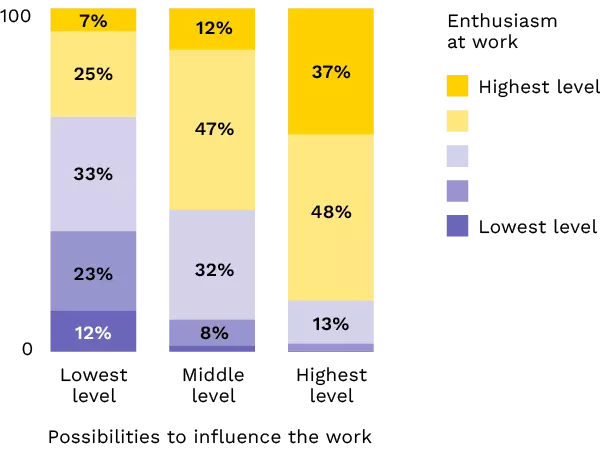Knowledge work is done in many fields, with the trend of accelerating work pace
Expert and knowledge work is done across almost all sectors, regardless of the industry, and the number of knowledge work professions has increased in recent years. Technological development and changes in the work environment accelerate the number of expert tasks and working with information. In expert tasks, workdays often include plenty of information processing, assimilation, and production, as well as problem-solving and decision-making. Knowledge work also emphasizes continuous learning, creativity, interaction skills, and working in networks.
One of the main change trends in knowledge and expert work are the increase in multi-location, or hybrid work, the emphasis on learning and skills, and the development and increased use of artificial intelligence.
One of the main change trends in knowledge and expert work are the increase in multi-location, or hybrid work, the emphasis on learning and skills, and the development and increased use of artificial intelligence.
Workload factors in expert work
Expert and knowledge work can involve timetable pressures, simultaneous work tasks, work interruptions caused by the overlapping of tasks and information overload. Interrelationships within networks and between individuals can also create conflicting expectations for the work as set by the different parties involved in the network. Harmful workload strain can be prevented by reducing work requirements and increasing work resources.
In expert work, harmful physical workload is most often related to the strain caused by screen work and sedentary work, which causes harmful stress to the musculoskeletal system. Harmful physical workload can be prevented, for example, through work ergonomics.
In expert work, harmful physical workload is most often related to the strain caused by screen work and sedentary work, which causes harmful stress to the musculoskeletal system. Harmful physical workload can be prevented, for example, through work ergonomics.
Expert work is independent of time and place
- Flexibility of work can support work ability, but in knowledge and expert work, the boundary between work and leisure time can often be blurred.
- Working conditions that support recovery and practices that promote balance between work and free time are key to work ability.
- The experience of recovery is clearly stronger when work hours and free time are in balance.
Disability pension incidence
Source: Elo's data (2023)

Key resources in expert and knowledge work
Key change trends in expert and knowledge work include the acceleration and intensification of working life, the impact of changes in working life on the building of work communities, and AI developments.
Keyways to support work ability in the middle of changes include Learning-oriented leadership, common ground rules that support the work, promoting the participation of the entire work community and the fostering of a supportive atmosphere.
Keyways to support work ability in the middle of changes include Learning-oriented leadership, common ground rules that support the work, promoting the participation of the entire work community and the fostering of a supportive atmosphere.
Balance between work and leisure increases recovery from work
Source: Elo's Work Community Indicator 2023

Opportunities for influence on work increase enthusiasm
Source: Elo's Work Community Indicator 2023

Phenomena and trends in knowledge and expert work
Cognitive work and work efficiency
In knowledge work, several tasks often need to be carried out simultaneously and the chances to take breaks from the work are fewer. In addition to an accelerating work pace, the demands for autonomous work, decision-making and career management as well as competence development have increased. Knowledge is characterised by continuous on-the-job learning and related management. Providing learning and development opportunities support the ability to work and by developing cognitive ergonomics, information overload can be managed and work requiring concentration can be supported.Artificial intelligence changes the nature of tasks
Artificial intelligence can be used to filter information and produce analyses from large amounts of data, but for those working in knowledge work, the development of artificial intelligence also creates new types of tasks. Creativity, social intelligence, the ability to anticipate the future, and decision-making requiring the understanding of broad entities still distinguish humans from machines. During transformation, the work ability of those working in knowledge and expert work can be supported by developing the skills needed in a changing operating environment.Social well-being of the work community
As remote and hybrid work have become more common, the social practices of work communities are changing. The loneliness experienced by people working in knowledge intense roles has increased. It is important for work communities to recognise the significance of emotions and the quality of interactions. Practices for strengthening the sense of communality in the workplace should be a focus when managing knowledge work.Solutions to support work ability in expert work
- Managing learning and skills
- Planning, organising, and clarifying expectations for work
- Managing information flow and reducing information overload
- Shared rules that support work and enable concentration
- Servant leadership and guiding remote work
- Investing in recovery practices
- Common practices for modifying work
- Building community and nurturing an
encouraging atmosphere
- Strengthening physical ergonomics
- Supporting the integration of work and free time